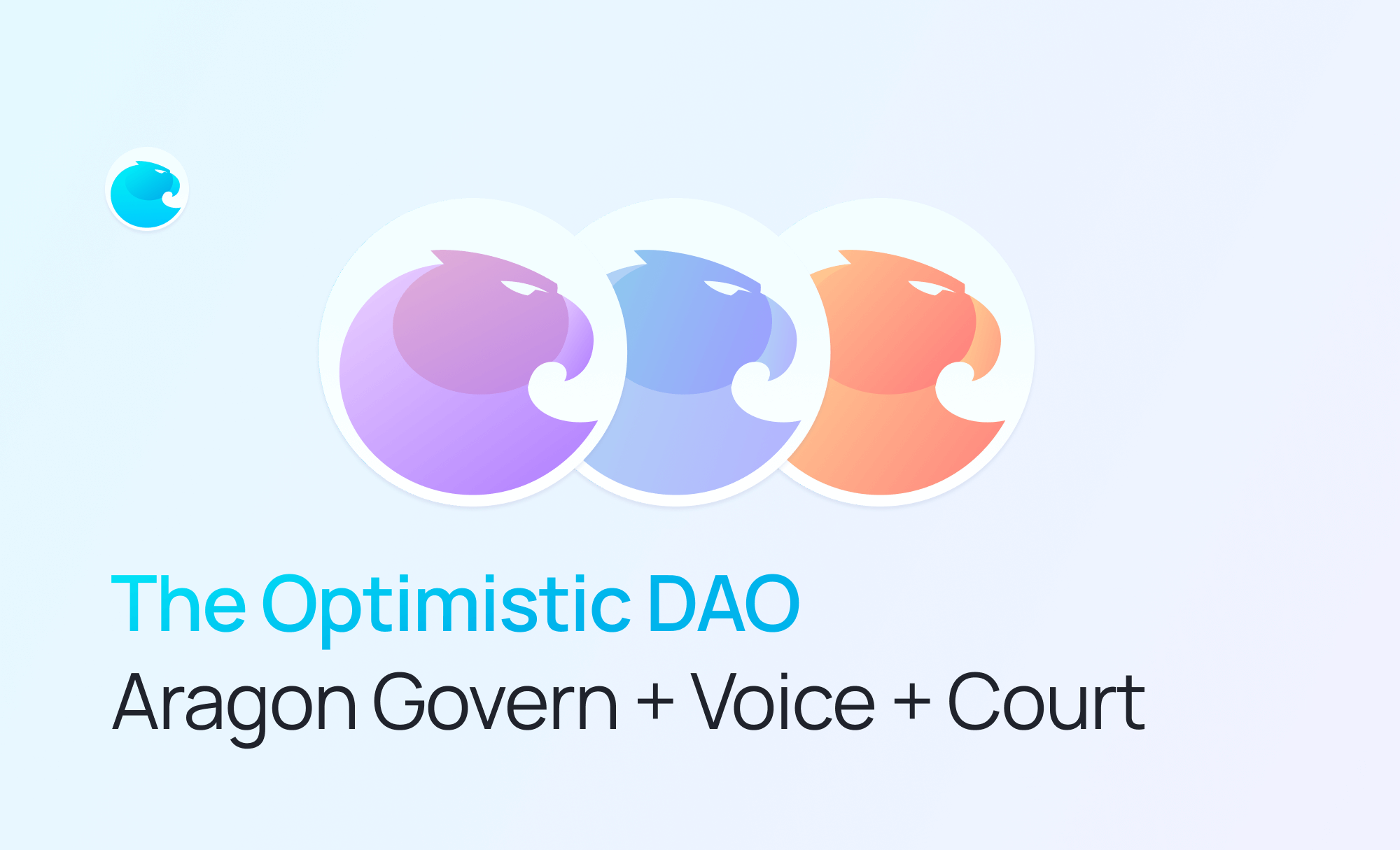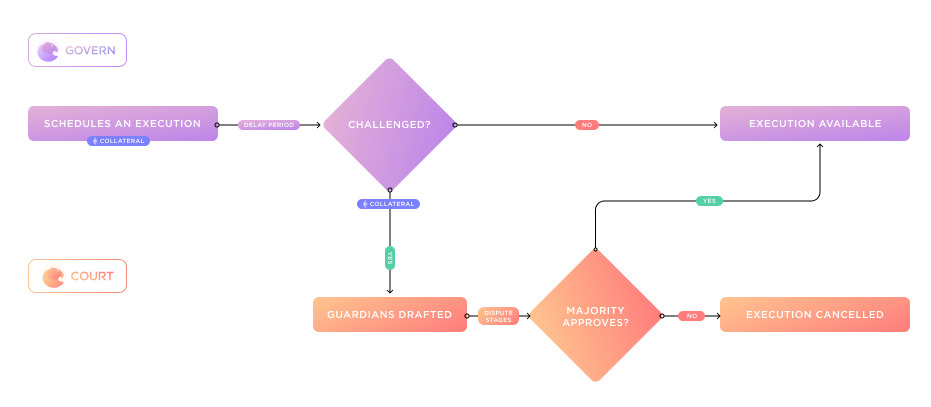The Optimistic DAO: Aragon Govern + Aragon Voice + Aragon Court
Aragon's pioneering Optimistic Governance solution is now live on mainnet. Aragon Govern, Aragon Voice and Aragon Court all work together to enable fast, efficient and safe DAO management.
Aragon

(Note: All references to $ANT refer to the latest contract address: 0xa117000000f279d81a1d3cc75430faa017fa5a2e. If you are holding $ANTv1 you may check and upgrade to the latest version here).
Over the last few months, we have been working hard to rationalize Aragon into a complete open-stack solution that takes advantage of the low fees and frictionless DAO management offered by Optimistic Governance. We are extremely grateful for the community's patience and can now announce that our full OG Stack of governance plugins are now live and interoperable: Aragon Govern, Aragon Voice, and Aragon Court. Aragon Govern is also available on Rinkeby for testing in a sandboxed environment.
On Aragon Govern, anyone can establish an Optimistic DAO with a subjective Agreement that is automatically within the jurisdiction of Aragon Court. To get started, mint or import your governance tokens into Aragon Govern, then invite token holders to freely create off-chain signaling proposals on Aragon Voice or collateralize actual on-chain transactions with a scheduled delay (to allow for any potential challenges).
In addition, following an indicative vote of almost 600k $ANT last year, $ANJ holders now have the option to upgrade to the latest $ANT contract at the improved exchange rate of 0.044. Any locked $ANT will automatically be staked on Aragon Court for a chance to be drafted into cases as a Guardian and qualify for the 40 $DAI Guardian fee. The more $ANT staked, the greater the chance of being drafted.
The Governance Stack: Separation of Crypto Powers
In the taxonomy of governance, Aragon Govern acts as a DAO's executive branch, responsible for enacting the will of the community as expressed by the legislature. In the Aragon OpenStack, the legislative role is performed by Aragon Voice, where token holders may make proposals and vote on them for free. The actions of Aragon Govern are justified by Aragon Voice, but if there is a disagreement between the two, this can be held to account by the third, judicial branch, Aragon Court.
These three branches working together is an example of the 'separation of powers', which has been established for over 250 years as best practice to avoid the concentration of power in any one branch of government.
What is Optimistic Governance?
Frictionless
Sometimes called 'lazy' consensus, Optimistic Governance assumes that all actions are legitimate unless proven otherwise. In practice, this means that governance becomes a perpetual-motion machine of proposals that are scheduled as on-chain transactions to execute by default, unless they are specifically challenged in Aragon Court during a Dispute Time Delay set by the DAO.
This is a simple and low-cost way of managing DAOs, optimized for action. A lazy consensus ensures that uncontroversial decisions can be made quickly and often, without voter exhaustion, but malicious or divisive proposals can be challenged in a fair and transparent way when necessary.
Safe
Aragon Govern protects DAOs in four main ways:
First, every DAO must have a DAO Agreement that defines the purpose and parameters of the community. Any transaction that deviates from this document may be challenged in Aragon Court and have its collateral slashed. For example, a simple written requirement that any transaction must be explicitly sanctioned by a ⅔ majority of >50% of outstanding tokens on Aragon Voice would be enough to deter 99% of bad-actors from risking their collateral.
Second, for more community control, Aragon Govern DAOs may restrict executive power to a whitelist of selected addresses so only they may schedule the transfer of funds.
Third, as mentioned, DAO transactions cannot be executed immediately. Instead, they are delayed by a period of time set by the DAO called the Dispute Time Delay. This assumes 'optimistically' that all transactions are legitimate but gives any DAO member the opportunity to challenge the transaction in our decentralized dispute resolution system, Aragon Court. A successful challenge will cancel the transaction.
Fourth, a collateral deposit set by the DAO is required to schedule a transfer of DAO funds. This is refunded at the close of the execution window unless someone has successfully challenged the transaction in Aragon Court, in which case it will be forfeited to the challenger.
Human
Despite the dispassionate, trust-minimized nature of DAO architecture, those created on Aragon Govern are based on written, subjective Agreements. These are critically important documents that set the purpose and agenda for decentralized communities. Without them, it would be impossible to distinguish a good transaction from a bad one and the DAO would have no direction. These documents may be written carefully to cover as many scenarios as possible and reduce the scope of interpretation but communities might find that the simplest solution is to stipulate that all transactions must be sanctioned by an indicative vote on Aragon Voice. Nevertheless, any transaction that is deemed contrary to the DAO Agreement may be challenged in Aragon Court.

Aragon Govern
As mentioned, Aragon Govern is purely an executive system for first architecting a DAO, and, thereafter, scheduling transactions. During the setup phase, Aragon Govern enables the DAO creator to mint a brand new token or import an existing one. In either case, the token can then be imported into Aragon Voice to begin hosting proposals.
Aragon Govern makes the day-to-day aspect of DAO management incredibly efficient by enabling any number of payments and contract changes to be batched into a single 'atomic' execution, saving gas and administration costs.
By default, any token holder may stake some collateral and add a transaction to the queue, making the process fully decentralized, and a combination of the DAO Agreement and Aragon Court acts as an equally decentralized 'immune system' against fraud, making the whole system self-reinforcing.

Aragon Voice
Within the Aragon stack, the executive is accountable to the legislative body gathered in Aragon Voice - a proposals platform, compatible with any ERC-20 token. Aragon Voice is a fluid, dynamic space where any DAO member - regardless of how many tokens they hold - can create proposals to be voted on by the community. If the DAO Agreement stipulates that any proposal with majority support must be implemented, then - upon a successful vote - anyone may schedule the accompanying transaction without fear of being challenged in Aragon Court. If the DAO Agreement is more prescriptive, token holders are still free to schedule transactions but must make sure that they are legitimate or risk losing their collateral. In this way, Optimistic DAOs are not only bastions of free speech, but also examples of a truly crowd-managed treasury.
Instead of delegated officials - as in traditional parliaments - Aragon Voice reduces the qualifications merely to holding the DAO token, which is a far better utilization of human resources than excluding 99% of the community from any participation in governance. This simple incentive model means that token holders can work to increase the value of the network and their own wealth by submitting proposals into a working Idea Meritocracy(1), where proposals that add the most value gather the most votes. In this way, Aragon - Voice in particular but in tandem with Aragon Govern and Aragon Court - embodies a wider movement away from a salaried economy and towards an equity economy, where people are active owners of the projects they contribute to and reap a reward more proportional to their efforts.
In this initial beta release, Aragon Voice can only be used as a signaling tool but in later releases it will be fully integrated with Aragon Govern to automatically schedule transactions upon a successful proposal.

Aragon Court
Aragon Court is a plug-in Web3 arbitration platform, accessible by API to any decentralized application (dApp) and fully implemented in the Aragon OpenStack.
Guardians
The court is staffed by any number of independent 'Guardians' who stake $ANT for the chance to be called as a juror to adjudicate on cases. Staking erects a form of Sybil Resistance(2) against bad actors posing as multiple Guardians at once. Guardians are chosen by a weighted-random algorithm, whereby the more $ANT staked, the greater the chance of being drafted into cases. Guardians are paid 40 $DAI per case.
Voting
Unlike traditional courts, Aragon Court Guardians are not asked to rule impartially on disputes. Instead, Aragon Court uses a game-theoretic mechanism that incentivizes Guardians to find the subjective truth or Schelling Point(3) of the case: Guardians who vote with the majority are rewarded with dispute fees and a portion of tokens from any Guardians who voted with the minority. This becomes a self-reinforcing Nash Equilibrium(4) where everyone votes truthfully because they expect everyone else to vote truthfully.
Above the immediate game dynamics of each case, there is an even stronger moderating influence exerted by the long-term market sentiment about $ANT. If potential litigants do not feel that Aragon Court is fair, they will sell their $ANT and switch allegiance to another decentralized jurisdiction, taking their entire DAO with them. Guardians are $ANT holders so their desire to increase the value of their holdings and secure their court fee revenue aligns with the objective of maximizing the reputation of Aragon Court.
Cases
Cases arise when any DAO member wishes to challenge a transaction in Aragon Govern. The first step is to collateralize the challenge with 10 $DAI, which will either be paid to the address that scheduled the transaction or refunded if the challenge is successful. The next step is to summon three Guardians to the dispute and pay the court fee of 150 $DAI, after which, the Dispute Time Delay window is closed, a dispute is automatically created in Aragon Court and the details of the case are relayed to the three Guardians to decide whether to allow or disallow the action. This takes place over a set number of 8-hour 'terms': six terms for Guardians to commit their votes, six terms to publicly reveal them and six terms to allow for an appeal. Once the judgement has been made, anyone can formally resolve the case by executing the final transaction. In this first version of Aragon Court, this will be covered by Aragon to save litigants from paying the gas fees.
Appeals
After the Guardian votes have been revealed, the losing party has six terms to appeal against the ruling and may appeal a total of three times. With every appeal, the number of Guardians increments by three to six, nine, and a final total of twelve and the cost to draft them increases proportionally. After an appeal has been requested, the opposition must confirm within six terms, otherwise they will lose automatically. The collateral to make an appeal is 300 $DAI and the collateral to confirm the appeal is 150 $DAI, all of which is collected by the winning party.

Optimistic Governance: The Whole Package
Low participation rates in DAOs have been blamed on high gas fees on the Ethereum network but the reality is that most communities do not want to spend hours every day voting on proposals: it is inefficient and unnecessary. Voting was key to the first phase of DAO development, but it's becoming clear that to be scalable, DAOs must be Optimistic.
In the early stages, we expect that DAOs will experiment with different forms of governance Agreements: some will attempt to mandate every potential scenario, others will rely on varieties of common-sense 'golden rules' and others will simply bind every transaction to an indicative vote. At this early stage in the development of DAOs, there is no best practice - we are all learning - but this new architecture enables rapid experimentation so best practices should quickly emerge and be a rising tide that lifts all boats. To this end, we encourage everyone to share their experiments and findings as broadly as possible.
In borrowing from well-established practices such as the separation of powers, the Aragon OpenStack is a declaration of intent for Web3 to be the next epoch of human organization. We are not aiming to tear down everything that has been gained in a petulant revolt, but rather to use all available knowledge to build a parallel system that will be ready to take over when the flaws of the current system finally catch up with it. With each iteration, we get closer to that goal.
References:
- Idea Meritocracy: https://www.linkedin.com/pulse/key-bridgewaters-success-real-idea-meritocracy-ray-dalio/
- Sybil Resistance: https://en.wikipedia.org/wiki/Sybil_attack
- Schelling Point: https://en.wikipedia.org/wiki/Focal_point_(game_theory)
- Nash Equilibrium: https://en.wikipedia.org/wiki/Nash_equilibrium
--
Aragon is building the future of decentralized governance for Web3 communities & organizations. Deploy a DAO, manage your community, resolve disputes and run enterprise-level votes, all within our open-source stack. See the latest at aragon.org, subscribe to our monthly newsletter, join the conversation on Discord, or follow us on Twitter.
Docs | YouTube | Telegram | Github | Reddit | Linkedin | Forum
Subscribe to The Eagle for weekly news on the Aragon Network
